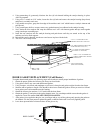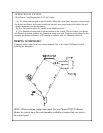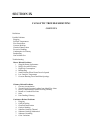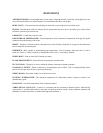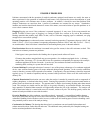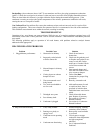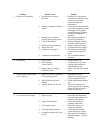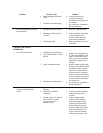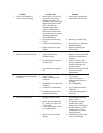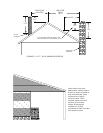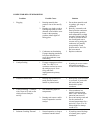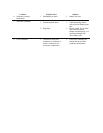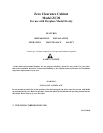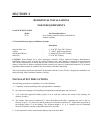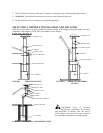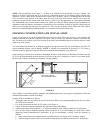
Problem
3. Heavy Concentration of
Smoke Leaving Chimney
4. Rusted or Corroded Flue Parts
5. Odor-Both Inside and Outside
The Home
6. Poor-Drafting Chimney
Possible Cause
1. Water vapor. (On cold, still
days water vapor may be
mistaken for smoke. The
difference is that water vapor
appears white and will tend
to rise vertically and
dissipate rapidly while
smoke is usually dark or
bluish brown and will drift
down and settle in low areas
near the ground before
slowly dissipating)
2. Wet, pitchy wood is being
burned
3. Combustor not functioning
4. Bypass warped or in open
position
1. Added moisture from
efficient burning
2. Overheated flue parts due to
a chimney fire
3. Age. Failure due to normal
use
1. Bypass is open
2. Smoke is leaking around
combustor
3 Backpuffs due to wind or hot
combustor
4. Combustor not functioning
5. Insert trim panels or direct
connect kit not sealed
1. Improper chimney height
2. Wrong flue size being used.
Ex. - using a 10” flue on an
8” flue collar
3. Cooler temperatures caused
by external chimney
4. Massive stone or masonry
chimney
Solution
1. Water vapor is normal and
should be of little concern
2. Burn dry, seasoned wood
3. See section on “Combustor-
Related Problems:
4. Replace warped bypass.
Close bypass.
1. Replace worn-out parts with
corrosion-resistant parts or
materials
2. Same as #1 above. Have
chimney inspected every 2-3
months of operation for
creosote build-up
3. Replace worn-out parts with
corrosion-resistant
replacements
1. Close bypass
2. Check for warped or
damaged parts. Replace if
necessary
3. See “Backpuffing”
4. See “Combustor-Related
Problems”
5. Check seal and regasket as
necessary
1. Extend height of chimney
(Meet Codes)
2. Use properly sized flue.
Install topper with 8”
chimney cap to hold heat in
3. Insulate chimney or build
chimney higher. In new
installations, try to utilize
internal chimney
4. Install chimney liner (meet
codes) Extend height



